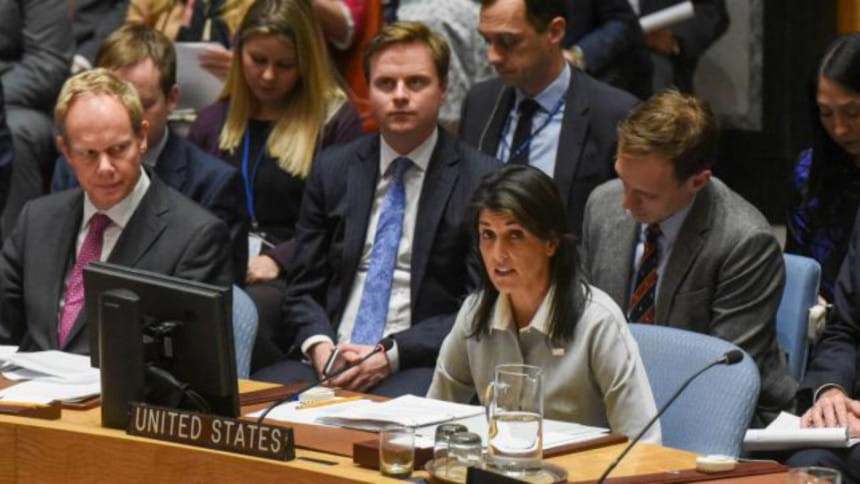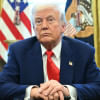What's behind Trump's Jerusalem gambit?

Donald Trump's recognition of Jerusalem as the capital of Israel has not only angered Palestinians but also outraged world leaders.
Jerusalem is not only significant politically but is also a rallying point for nationalistic reasons. It has immense religious significance for all the three revealed religions: Islam, Christianity and Judaism. The eastern part of Jerusalem is particularly significant for Muslims because of Al-Aqsa Mosque and the gold-topped Dome of the Rock, Islam's third holiest site. It also has St James Church and the Church of the Holy Sepulchre (burial place of Christ)—the holiest sites for Christians. The Western Wall is sacred to Jews. So recognition of Jerusalem as Israel's capital has naturally angered the Holy See and Muslims around the world.
On December 6, President Trump in a statement at the White House said, "I have determined that it is time to officially recognise Jerusalem as the capital of Israel." He gave two justifications: First, he was delivering on his campaign promise, clearly to appease Evangelical Christians, pro-Israeli Republicans and his raucous supporters. And secondly, waivers on the Jerusalem Embassy Act could not bring lasting peace between Israel and Palestinians. He said that repeating the waiver would not produce a better result. He, however, called on all parties to maintain the status quo of Jerusalem and said that the US would support the two-state solution.
The US Congress in 1995 adopted the controversial Jerusalem Embassy Act which required the US to recognise Jerusalem as the capital of Israel and establish the US embassy there. However, the president was given powers to waive the provisions of the Act. Over the past 22 years, all presidents—Bill Clinton, George W Bush and Barack Obama—waived the Act every six months.
Donald Trump also signed the waiver on December 6, but asked the State Department to prepare to move the US embassy to Jerusalem. White House officials however said that it would take three years to move the embassy there. Most countries do not recognise Israel's sovereignty over Jerusalem and there are no foreign embassies in Jerusalem, though Israeli government offices and the Knesset are located there.
By making this unilateral declaration Trump has breached international law. Fortunately, neither Trump nor Netanyahu can change the legal status of Jerusalem as an occupied city because of dozens of UNSC resolutions, including resolution 242/1967 which demands complete Israeli withdrawal from all occupied territories, including Jerusalem. Jerusalem has been a divided city since 1948—the western side controlled by Israel and the eastern part by Palestinians. The eastern side is designated as the capital of future Palestine.
Soon after the announcement there were celebrations in Israel, while one of the stone-throwing Palestinians was killed on December 8, when they clashed with the Israeli military in the Gaza Strip and West Bank. Palestinian President Mahmoud Abbas declared, "Jerusalem is the eternal capital of Palestine." They have already pre-empted the outcome. He said the peace process is finished and America has ceased to be an honest peace mediator.
Jordan and Palestinians have called for an emergency foreign ministers' meeting of the Arab League on December 9. Turkey, which holds OIC Chairmanship, has called for an OIC summit on December 13 in Istanbul. Unfortunately, both the OIC and Arab League are divided. UN Secretary General Guterres emphasised that Jerusalem was a final-status issue to be resolved through direct talks. At the UN Security Council meeting on December 8, US Ambassador Nikki Haley was severely criticised by the other 14 members. Apart from enthusiastically denouncing Trump's obstinacy, these organisations have very little to offer the abandoned Palestinians.
Trump decided to make this arrogant move at a time when the Arab world is extremely divided and heavily involved in Shia-Sunni sectarian conflicts through proxy wars. What's worse is that the unity deal signed on October 12 between Hamas and Fatah has floundered. Without unity among different factions of the Palestinians it would be hard to mount an intifada (uprising), as called by Hamas leader Ismail Haniyeh.
One smells a deep conspiracy behind Trump's reckless gambit. The recent events happening in the region indicate that. Palestinian President Abbas was summoned to Riyadh on November 6, apparently being warned against unity with Hamas. Lebanese PM Saad Hariri was also summoned to Riyadh on November 12, where he announced his resignation but subsequently withdrew it. This was an attempt by Saudi Crown Prince Salman to curb the influence of Hezbollah based in southern Lebanon—a big threat to Israel. The GCC meeting on December 5 in Kuwait, instead of addressing Trump's decision, ended abruptly as several heads of states were absent. The assassination of Yemen's ex-president Ali Abdullah Saleh, Riyadh's nemesis; the blockade of Qatar by Saudi Arabia; and Riyadh's lukewarm criticism of Trump's decision all point towards a plan to contain the influence of Iran, a sworn enemy of Israel. Besides Crown Prince Salman's friendship with Jared Kushner, Donald Trump's son-in-law and special envoy to resolve the Israeli-Palestinian crisis, may have played a role in Trump's decision on Jerusalem.
Palestinian-Israeli negotiations have stalled since April 2014, essentially because of Netanyahu's obstinacy. One has to wait and see what Vice President Mike Pence says to President Abbas when he visits the region in late December. It is likely that Abbas will be invited to the White House and offered a deal. Clearly, Trump's decision was designed to force Abbas to make concessions. But it is unlikely that Abbas will make concessions that Israel demands. Trump is closer to Israel than any previous US president. But Trump's gambit may not succeed because he has created profound mistrust amongst the Palestinians.
There is strong suspicion that a conspiracy is afoot to humiliate and deny the Palestinians their rightful state. The coming days will most likely explode in bloody resistance in Palestine with Israeli military shooting down the stone-throwing Palestinian youths with impunity.
Mahmood Hasan is a former ambassador and secretary of the Bangladesh government.










Comments